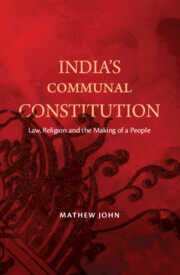1 - The Communalisation of Religion in Indian Constitutional Law
Published online by Cambridge University Press: 05 August 2023
Summary
This chapter begins the task of charting the communal identification of the Indian people in the constitutional practice of religious freedom. It does so by drawing on a genealogical account of toleration and the movement to reform religious practices in colonial India as they have determined the contours of religious freedom in the Indian Constitution. Doing so, this chapter also sets out the methodological approach through which this book makes salient the forms in which colonial state practice communally inflects contemporary constitutional design and practice.
Outlines of the Constitutional Scheme Regulating Religion
To make apparent the form in which the government of religion by the Indian Constitution communally inflects the identity of the Indian people, it is important to begin by outlining the contours along which the Constitution seeks to regulate religion and religious freedom in particular. The obvious place to begin this task would be the provisions on religious freedom which are laid out in a set of four constitutional provisions in the chapter on fundamental rights (Articles 25–28). Between them, these provisions protect the right to religious freedom for individuals and groups, provide for state action against religion in the public interest, and specifically mention instances where the state and religious power ought not to impose themselves on an unwilling public. These provisions would seem like those of any liberal constitution. Therefore, uncovering a communal dimension from these broadly liberally inclined provisions requires deeper scrutiny of their structure and practice.
Of the provisions spanning Articles 25–28, Articles 27 and 28 deal with very particular concerns bearing on the power of the state to impose religious taxes (Article 27) and the bar on religious instruction in educational institutions run on state funds (Article 28). Important as these constitutional guarantees might be, they have not determined the course of religious freedom in the Indian Constitution. On the other hand, Articles 25 and 26 have been key provisions that have determined the template that has come to organise state power as it has been exercised over religion.
Examining these provisions in greater detail, Article 25(1) is structured like a standard liberal freedom where the right to practise, profess and propagate religion is granted to all individuals.
- Type
- Chapter
- Information
- India's Communal ConstitutionLaw, Religion, and the Making of a People, pp. 17 - 45Publisher: Cambridge University PressPrint publication year: 2024



